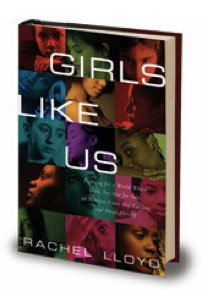NCFY Reads: Rachel Lloyd's 'Girls Like Us'
 “Girls Like Us: Fighting for a World Where Girls Are Not for Sale”
“Girls Like Us: Fighting for a World Where Girls Are Not for Sale”
by Rachel Lloyd
In this memoir, a well-known advocate exposes the horrors of sex trafficking, and tells us what it will take to create a society that values and protects girls. NCFY read it, and we tell you why we think it’s a good read for youth workers.
Rachel Lloyd grew up in England with a depressive, alcoholic mother and her series of violent boyfriends. By 14, she had dropped out of school. Faking her age, she did factory work to keep a roof over their heads.
“The pressure to have a baby, at fourteen, already feels intense,” she writes in her memoir “Girls Like Us: Fighting for a World Where Girls Are Not for Sale.” “The desire to create a family, to have someone who will love me, is overwhelming at times. … Having a baby, getting a council flat, working and living and dying here, feels like the most attainable goal.”
Instead, she bought a ticket to Germany, where she wound up broke and desperate. She took a job at a strip club to try to save money for a ticket home. Then she met JP, a former American soldier with a crack addiction. He quickly won her over and then turned violent, routinely beating her and nearly killing her, when she didn’t bring home enough money to feed his habit.
Fighting for a Better World
Lloyd eventually found safety and the support to change her life through a tight-knit, accepting community on a U.S. military base. After moving to New York to be an outreach worker to sexually exploited girls, she founded Girls Educational and Mentoring Services in 1998 to recreate that oasis as best she could.
Lloyd weaves her dramatic but ultimately hopeful story with those of a number of girls she’s helped -- and many she was unable to help -- at GEMS. The result is an examination of how society repeatedly fails and victimizes sexually exploited and trafficked girls, and what these girls need from “the system” as they try to put their lives back together again.
Lloyd writes:
Regardless of the circumstances, what makes the most difference in whether a girl leaves [a life of exploitation] or not when the door opens up is if she believes she has options, resources, somewhere to go, and the support she’ll need once she’s out. Without that glimmer of hope, whether it comes in the form of family, a program like GEMS, or a church community like the one that helped me, it’s unlikely that she’ll leave. And then the door will close just as quickly as it opened, leaving her feeling trapped once more, and this time even more convinced that this is the life she is destined to lead.
Even for youth workers, sex trafficking can seem unimaginable and overwhelming. Lloyd’s book shows that the victimization is real. But the book also argues that solutions to the problem can start in small, manageable doses – a truly safe space, patience, a non-judgmental ear.
More From NCFY
Listen to our podcast interview with Rachel Lloyd about combating sex trafficking.


 Sign up
Sign up Follow us
Follow us Like us
Like us Sign up for our RSS feeds:
Sign up for our RSS feeds: 

